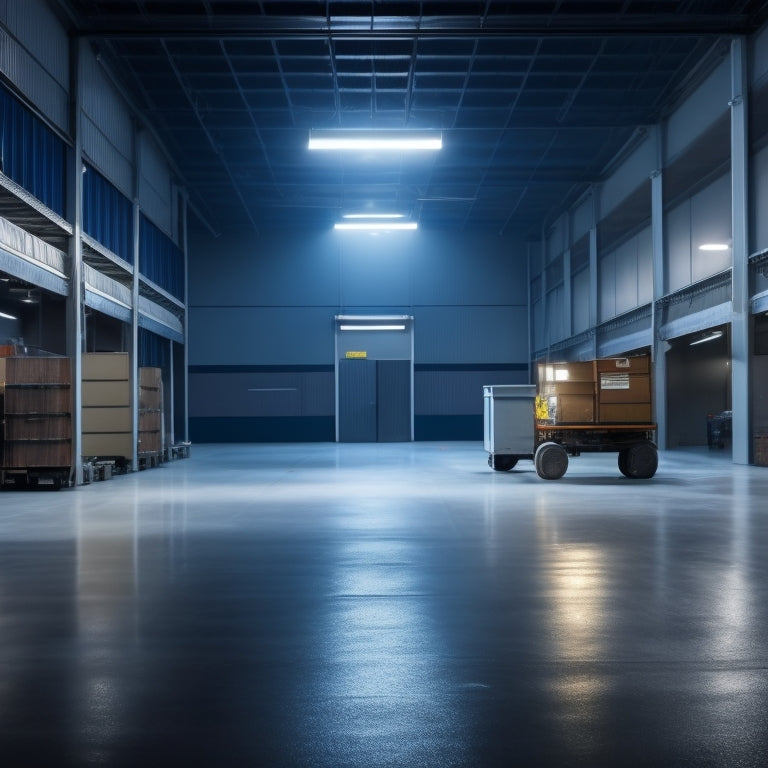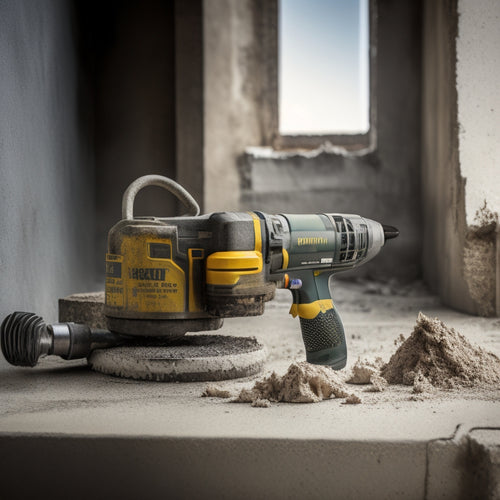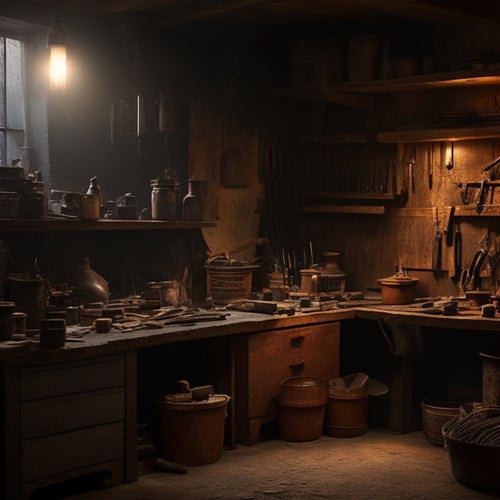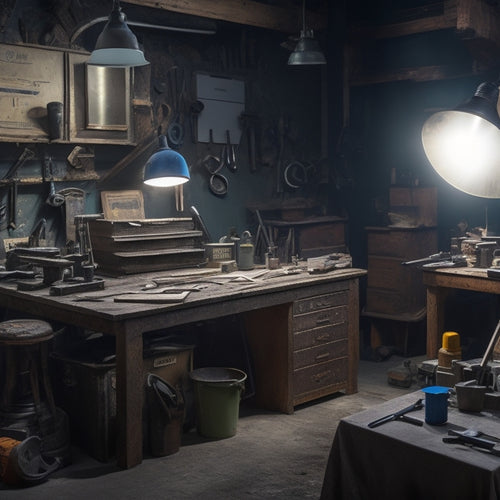
Best Epoxy Concrete Floor Sealants for Renovation
Share
When selecting the best epoxy concrete floor sealants for your renovation project, consider the specific demands of your floor. Top-rated epoxy sealants provide exceptional performance and durability, resisting stains, cracks, and damage while offering a chemical-resistant barrier. You can choose from epoxy paint, industrial-strength sealers, and clear coatings with high-gloss finishes. Consider factors like chemical resistance, aesthetic options, and application techniques to guarantee a successful renovation. With the right sealant and proper maintenance, your concrete floors can last up to 20 years. Now, explore the specifics of each option to find the perfect fit for your project.
Key Takeaways
• For exceptional performance and durability, choose epoxy sealants that provide a chemical-resistant barrier against stains, cracks, and damage.
• Select epoxy paint for concrete floors based on unique strengths and weaknesses, such as 100% solids epoxy for maximum durability and chemical resistance.
• Industrial-strength floor sealers are designed for high-traffic areas and can withstand chemical spills and heavy machinery, but require proper application and maintenance.
• Consider chemical resistance levels when selecting a sealant, as low-to-medium resistance is suitable for mild cleaning products, while high resistance is required for strong acids or alkalis.
• Proper application techniques, including surface cleaning, primer use, and thin, even layers, are crucial for achieving a durable and long-lasting epoxy concrete floor sealant.
Top Rated Epoxy Concrete Sealants
When selecting an epoxy concrete sealant, you'll want to contemplate the top-rated options that have been proven to deliver exceptional performance and durability. These sealants are formulated to provide a strong, chemical-resistant barrier that protects your concrete floor from stains, cracks, and damage.
To guarantee a successful application, it's vital to follow proper application techniques. This includes thoroughly cleaning the surface, applying a primer if necessary, and mixing the epoxy according to the manufacturer's instructions. Additionally, consider the thickness of the coat, as this can impact the sealant's effectiveness.
For best results, it's also essential to maintain your epoxy concrete sealant correctly. Regular cleaning with a mild detergent and water can help prevent dirt and grime from building up. Avoid using harsh chemicals or abrasive materials that can damage the sealant.
Best Clear Epoxy Coatings
When selecting the best clear epoxy coatings for your concrete floor, you'll want to take into account three critical factors.
You're looking for a high-gloss finish that enhances the floor's appearance, a high chemical resistance level to guarantee the coating withstands spills and cleaning products, and a coating that passes the UV stability test to prevent yellowing or discoloration over time.
High Gloss Finish
By applying a high gloss finish clear epoxy coating, you can achieve a highly reflective, mirror-like appearance that enhances the aesthetic appeal of your concrete floor. This finish is ideal for commercial or residential spaces where visual appeal is vital.
To achieve the best results, it's important to follow proper application techniques. Confirm the floor is clean, dry, and free of imperfections before applying the coating. Apply thin, even layers, allowing each layer to cure before applying the next. This will prevent bubbles and unevenness.
For maintenance, regular cleaning with a mild detergent and water is sufficient. Avoid using harsh chemicals or abrasive materials, as they can damage the coating.
To maintain the high gloss finish, apply a maintenance coat every 5-7 years, depending on foot traffic and wear. By following these application techniques and maintenance tips, you can enjoy a durable, high-gloss finish that elevates the appearance of your concrete floor for years to come.
Chemical Resistance Level
Your concrete floor's exposure to harsh chemicals demands a clear epoxy coating that can withstand corrosive substances, and selecting the right one hinges on understanding the chemical resistance level you need.
As you consider different epoxy coatings, you'll encounter various levels of chemical resistance, ranging from low to high. The level you need depends on the type and frequency of chemical exposure your floor will face. For instance, if your floor will be exposed to mild cleaning products, a low-to-medium chemical resistance level may suffice. However, if you work with strong acids or alkalis, you'll need a high chemical resistance level to guarantee the sealant's longevity.
When evaluating epoxy coatings, look for the manufacturer's chemical resistance ratings, usually provided in the form of a chart or table. This information will help you determine which products can withstand the specific chemicals your floor will encounter.
UV Stability Test
Exposure to UV light can cause epoxy coatings to degrade, yellow, or become brittle, which is why you should look for clear epoxy coatings that have undergone rigorous UV stability testing to confirm they can withstand the harsh effects of ultraviolet radiation. UV stability testing confirms epoxy longevity, as it simulates the effects of prolonged UV exposure on the coating. This test helps you identify epoxy coatings that can maintain their clarity, gloss, and performance over time.
Here's a comparison of popular clear epoxy coatings and their UV stability test results:
| Epoxy Coating | UV Stability Test Duration | Color Change (ΔE) |
|---|---|---|
| Epoxy A | 500 hours | 0.5 |
| Epoxy B | 1000 hours | 1.2 |
| Epoxy C | 2000 hours | 0.2 |
| Epoxy D | 3000 hours | 2.1 |
| Epoxy E | 4000 hours | 0.8 |
When selecting a clear epoxy coating, look for products with minimal color change (ΔE) and prolonged UV stability test durations. This confirms the epoxy coating will maintain its appearance and performance, even in high-UV environments. By considering UV stability testing, you can make an informed decision and choose an epoxy coating that will withstand UV degradation and provide long-lasting results.
Epoxy Paint for Concrete Floors
When you're considering epoxy paint for your concrete floors, you'll want to understand the different types available, as each has its own strengths and weaknesses.
Before applying the paint, you'll need to guarantee the surface is properly prepared, as a strong bond between the paint and concrete is essential.
Types of Epoxy Paint
You'll find that epoxy paint for concrete floors comes in several types, each formulated to address specific performance requirements and environmental conditions. Understanding the different epoxy paint types is essential in selecting the right product for your renovation project.
-
100% Solids Epoxy: Offers excellent durability, chemical resistance, and adhesion. It's ideal for high-traffic areas, industrial floors, and spaces that require maximum protection.
-
Solvent-Based Epoxy: A cost-effective option with good durability and chemical resistance. It's suitable for general-purpose applications, such as residential floors and light-industrial spaces.
-
Water-Based Epoxy: A low-VOC, eco-friendly option with moderate durability and chemical resistance. It's perfect for areas with strict environmental regulations or where VOC emissions are a concern.
When selecting an epoxy paint type, consider factors like floor traffic, exposure to chemicals, and environmental conditions.
Additionally, application techniques, such as roller or brush application, can impact the final result.
Preparation Is Key
Proper surface preparation is critical to guaranteeing a strong, long-lasting bond between the epoxy paint and the concrete floor, as any imperfections or contaminants can compromise the entire application. You must ascertain the floor is free of dirt, oil, and other substances that can interfere with the epoxy's adhesion.
Start by conducting a thorough surface cleaning, using a degreaser or a strong detergent to remove any grime or stains. Next, inspect the floor for any cracks or crevices that need to be filled. Fill them with a concrete patching compound and let it dry completely before proceeding.
Moisture control is also essential, as excess moisture can cause the epoxy to peel or delaminate. Check the floor for any signs of moisture issues, such as efflorescence or water spots. If you find any, you'll need to address them before applying the epoxy paint.
Consider using a moisture-blocking primer or a waterproofing membrane to guarantee a dry, stable surface. By taking the time to properly prepare your concrete floor, you'll be rewarded with a durable, long-lasting finish that will withstand heavy foot traffic and harsh environmental conditions.
Color and Finish
Selecting the right epoxy paint for your concrete floor involves choosing from a vast array of colors and finishes that can enhance the aesthetic appeal and functionality of your space.
You'll want to contemplate the overall ambiance you want to create, as well as the level of durability and performance you need.
When it comes to color options, the possibilities are endless. You can choose from:
-
Solid colors: Perfect for creating a bold, monochromatic look or matching your brand's color scheme.
-
Flake finishes: Add a decorative touch with metallic or colored flakes that create a unique, eye-catching effect.
-
Quartz finishes: Incorporate aggregate particles for added texture and visual interest.
In addition to color, you'll also need to think about finish textures.
Do you want a high-gloss finish that's easy to clean, or a matte finish that hides imperfections?
Perhaps a textured finish that provides extra traction is what you need.
Industrial Strength Floor Sealers
By incorporating industrial strength floor sealers into their maintenance routine, facilities can greatly extend the lifespan of their epoxy concrete floors.
These heavy-duty sealers are designed to withstand the rigors of high-traffic areas, chemical spills, and heavy machinery, making them ideal for industrial settings.
When selecting an industrial strength floor sealer, it's vital to take into account the specific demands of your facility. Look for products that offer superior durability, stain resistance, and ease of cleaning.
Proper application techniques are critical to guarantee a successful seal. Follow the manufacturer's instructions, and make sure the floor is thoroughly cleaned and prepared before application. Apply the sealer in thin, even coats, allowing each coat to dry completely before applying the next.
Maintenance tips include regular cleaning with a mild detergent, avoiding harsh chemicals, and performing regular inspections for signs of wear.
High Gloss Epoxy Finishes
You can take your industrial-strength epoxy concrete floor to the next level by applying a high gloss epoxy finish, which not only enhances its appearance but also increases its durability and stain resistance. This type of finish is ideal for high-traffic areas, garages, and commercial spaces where a reflective, showroom-like appearance is desired.
When applying a high gloss epoxy finish, it's crucial to follow proper application techniques to achieve a smooth, even coat. This includes preparing the surface by cleaning and degreasing, applying a primer or base coat, and then applying the high gloss topcoat.
Additionally, consider the following tips for a successful application:
-
Ascertain the surface is dry and free of moisture before applying the finish.
-
Use a high-quality roller or brush to apply the finish, working in sections to maintain even coverage.
-
Allow the finish to cure according to the manufacturer's instructions before exposing it to heavy traffic or chemicals.
Durable Epoxy Floor Coatings
Durable epoxy floor coatings provide a robust barrier against scratches, cracks, and fading, making them an ideal choice for high-traffic areas, warehouses, and industrial facilities where floor integrity is paramount.
You can rest assured that these coatings will withstand the wear and tear of daily use, ensuring your epoxy floor longevity.
To get the most out of your durable epoxy floor coating, follow these maintenance tips: regularly clean the floor to prevent dirt buildup, use a soft-bristled broom or mop to avoid scratching the surface, and avoid using harsh chemicals or abrasive cleaners that can damage the coating.
Additionally, consider applying a sacrificial wax coating to protect the epoxy from daily wear and provide an extra layer of protection.
By following these simple maintenance tips, you can extend the life of your epoxy floor coating and keep it looking like new for years to come.
With the right care and attention, your durable epoxy floor coating will continue to perform flawlessly, providing a strong and durable surface that can withstand even the toughest environments.
Chemical Resistant Sealants
Chemical spills and splashes pose a significant threat to epoxy floor coatings, but chemical resistant sealants can effectively shield your floors from corrosive substances, ensuring a safe and healthy working environment.
When selecting a chemical resistant sealant, it's crucial to take into account the type of chemicals you'll be working with and the level of resistance you need. You'll want to look for sealants that are specifically designed to withstand chemical spills and splashes.
Some key features to take into account include:
-
High chemical resistance ratings
-
Ability to withstand frequent cleaning and chemical spill cleanup
-
Compatibility with various surface preparation techniques
Frequently Asked Questions
Can Epoxy Sealants Be Used on Newly Poured Concrete Floors?
When you're considering epoxy sealants, you'll need to wait until your newly poured concrete floor has fully cured, usually 28 days. Then, guarantee proper surface preparation, including cleaning and degreasing, before applying the sealant for ideal adhesion and performance.
Are Epoxy Concrete Sealants Resistant to High Foot Traffic?
As you step into the fray, you'll find epoxy concrete sealants are the unsung heroes of high-traffic areas, boasting impressive durability and low maintenance requirements, allowing you to withstand the wear and tear of heavy foot traffic with confidence.
How Long Does It Take for Epoxy Sealants to Fully Cure?
You'll find that the cure time of epoxy sealants varies depending on factors affecting the process, such as temperature, humidity, and thickness of the application, typically ranging from a few hours to several days for full cure.
Can Epoxy Sealants Be Applied Over Existing Coatings?
You'll be a million times more successful if you prep the surface properly! Before applying epoxy sealants over existing coatings, make certain the previous layer is fully cured and lightly sanded, then adapt your application techniques accordingly for a strong bond.
Are Epoxy Concrete Sealants Safe to Use in Food Preparation Areas?
When selecting an epoxy concrete sealant for food preparation areas, you guarantee food safety by choosing a product that meets FDA regulations and has a smooth, non-porous surface texture, preventing bacterial growth and ease of cleaning.
Conclusion
You've weighed your options and narrowed down the best epoxy concrete floor sealants for your renovation project.
Now, you can choose between top-rated sealants, clear epoxy coatings, epoxy paint, industrial-strength floor sealers, high-gloss finishes, durable coatings, and chemical-resistant sealants.
Each option offers unique benefits, from protection and durability to aesthetics and performance.
By selecting the right epoxy concrete floor sealant, you'll guarantee a strong, long-lasting, and visually appealing floor that meets your needs and exceeds your expectations.
Related Posts
-

Top Drill for Concrete Wall Renovation
When choosing the top drill for your concrete wall renovation, you'll want to prioritize key features like drill powe...
-

Why Invest in Quality Plastering Tools for Renovation
When renovating, investing in quality plastering tools is essential for achieving professional-looking results and mi...
-

What to Inspect When Buying Used Renovation Tools
When buying used renovation tools, you need to scrutinize every detail to avoid costly mistakes. Inspect for rust and...


